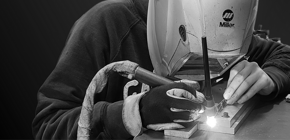In the aerospace industry, welding plays a crucial role in ensuring the structural integrity and safety of aircraft, spacecraft, and their components. To guarantee the highest standards of quality and reliability, rigorous welding inspection and quality control processes are implemented. In this blog post, we will explore the significance of welding inspection and quality control in the aerospace industry, as well as the industry standards that govern these practices.
Importance of Welding Inspection:
Welding inspection is a vital step in the manufacturing and maintenance of aerospace structures. It involves thorough examinations of welds to identify defects, discontinuities, and deviations from specified requirements. Through comprehensive inspection, potential flaws can be detected and rectified before they compromise the performance or safety of aerospace systems.
Welding Inspection Techniques:
Various inspection techniques are employed in the aerospace industry to ensure the quality of welds. These include visual inspection, liquid penetrant testing, magnetic particle testing, radiographic testing, ultrasonic testing, and eddy current testing. Each method has its advantages and is chosen based on the specific requirements of the application and the type of weld being inspected.
Welding Quality Control:
Welding quality control encompasses a range of measures aimed at maintaining consistency and adherence to specified standards throughout the welding process. It involves meticulous monitoring of welding parameters, qualified personnel, and robust documentation. Quality control procedures ensure that welds meet the necessary strength, integrity, and performance criteria required for aerospace applications.
Industry Standards and Regulations:
The aerospace industry follows stringent standards and regulations to ensure the highest level of quality and safety. These include standards set by organizations such as the International Organization for Standardization (ISO), the American Welding Society (AWS), and the National Aerospace and Defense Contractors Accreditation Program (Nadcap). Compliance with these standards and regulations is essential for manufacturers, suppliers, and service providers involved in aerospace welding.
Certification and Accreditation:
To demonstrate their commitment to quality and meet industry requirements, many aerospace welding companies pursue certifications and accreditations. These certifications, such as ISO 9001 and AS9100, validate that the company's welding processes and quality control systems adhere to established standards. Nadcap accreditation specifically focuses on the aerospace industry and ensures compliance with stringent requirements for welding and other processes.
Welding inspection and quality control are integral components of the aerospace industry's commitment to excellence and safety. By implementing thorough inspection techniques and robust quality control measures, aerospace manufacturers can identify and rectify potential flaws in welds, ensuring the structural integrity and reliability of their products. Compliance with industry standards and regulations, along with certifications and accreditations, further validate the commitment of aerospace welding companies to meet and exceed industry expectations.

COMMENTS